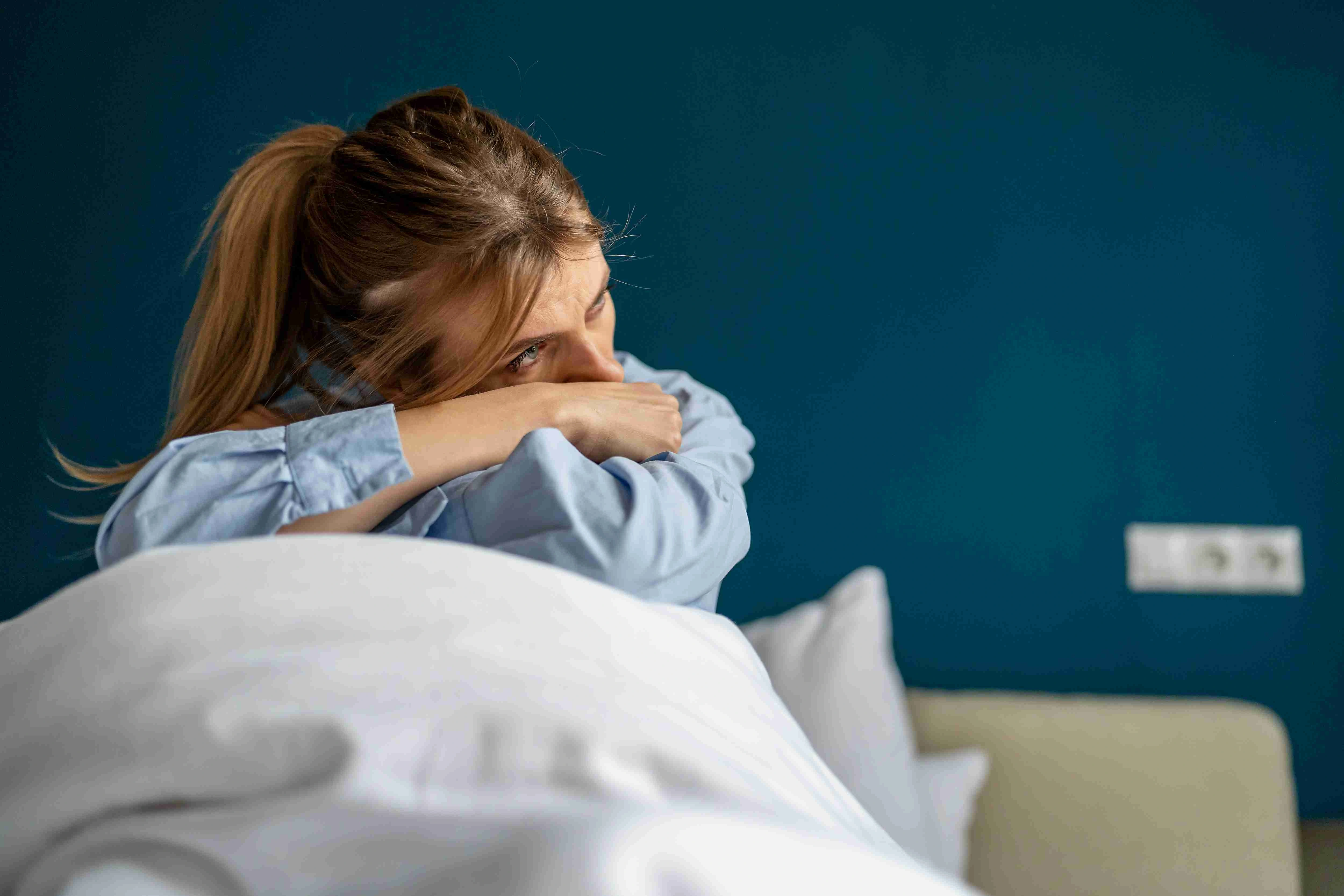Stress and insomnia are two interconnected conditions that can greatly impact an individual's well-being and daily functioning. Stress, whether caused by work, relationships, or other life events, can lead to difficulties in falling asleep and staying asleep.
The relationship between stress and insomnia is complex, as stress can both cause and exacerbate insomnia symptoms.
Understanding the connection between stress and insomnia is crucial for developing effective interventions and strategies to improve sleep quality and overall mental health.
What Is Stress-Induced Insomnia?

High levels of stress can cause difficulty falling or staying asleep, a condition known as stress-induced insomnia.
Stress-induced insomnia can have various negative effects on a person's health and well-being, including fatigue, irritability, difficulty concentrating, and decreased productivity.
How Stress Impacts Sleep
When a person experiences stress, their body releases stress hormones, such as cortisol, which can disrupt the natural sleep-wake cycle.
Insomnia, which manifests as difficulty falling asleep, frequent waking up during the night, or waking up too early in the morning and not being able to fall back asleep, can result from this disruption.
Stress Impact on Health
It is crucial to understand the impact that stress can have on our physical and mental health, so we can start taking steps to reduce stress levels and reduce the risk of developing health issues and disorders.
It is important to prioritize self-care and find healthy ways to cope with stress for the sake of our overall well-being.
Physical Health
Here are some of the physical health issues that come with stress:
- Cardiovascular: Our body's natural response is to release stress hormones, such as cortisol and adrenaline. These hormones can cause an increase in heart rate and blood pressure, leading to cardiovascular issues. Prolonged exposure to stress can contribute to the development of conditions like hypertension, heart disease, and even heart attacks.
- Gastrointestinal: Many people experience digestive problems when they are under stress. This is because stress can disrupt the normal functioning of the digestive tract, leading to symptoms such as stomachaches, diarrhea, or constipation.
- Musculoskeletal: When we are stressed, our muscles tend to tense up as a protective mechanism. This constant muscle tension can lead to muscle aches and pains, tension headaches, and even contribute to the development of conditions like temporomandibular joint disorder (TMJ).
- Respiratory: When under stress, individuals may experience shallow breathing or even hyperventilation, which can lead to respiratory issues such as shortness of breath or an increased risk of asthma attacks.
- Weakened Immune System: Stress can weaken the immune system, making individuals more susceptible to infections and illnesses. The body's response to stress involves the release of cortisol, a hormone that suppresses immune function. This can result in a decreased ability to fight off viruses and bacteria, leading to more frequent illnesses and a longer recovery time.
- Sleep Disorders: Stress can disrupt the normal sleep cycle, making it difficult for individuals to fall asleep or stay asleep throughout the night. This can lead to insomnia or other sleep disorders, which can further exacerbate the negative impact of stress on physical health.
- Hormonal Imbalances: When our bodies are under stress, the adrenal glands release cortisol, commonly known as the stress hormone. This hormone plays a crucial role in regulating various bodily functions, including metabolism, immune response, and blood pressure. However, prolonged exposure to elevated levels of cortisol can disrupt the delicate balance of hormones in the body, leading to hormonal imbalances.
Mental Health
Here are some of the mental health issues that come with stress:
- Anxiety: Anxiety is characterized by excessive worrying, restlessness, and a constant feeling of unease. When individuals experience high levels of stress, their anxiety levels can escalate, making it difficult for them to manage everyday tasks and activities. This can negatively affect their overall mental well-being and quality of life.
- Depression: When individuals are overwhelmed with stress, they may feel a sense of hopelessness, lack of interest in activities they once enjoyed, and persistent sadness. This is known as depression, and these symptoms can interfere with their ability to function normally and can lead to a decline in their mental health.
- Nervousness: When individuals are under significant pressure or facing challenging situations, they may experience heightened nervousness, which can manifest as jitteriness, racing thoughts, and difficulty concentrating. This can significantly impact their ability to focus on tasks and make decisions, further increasing their stress levels.
- Cognitive Impairment: High levels of stress can impair memory, attention span, and the ability to think clearly. Individuals may find themselves forgetting important information or struggling to complete simple tasks that they were once able to handle without difficulty. This cognitive impairment can further contribute to feelings of frustration and stress, creating a cycle that is difficult to break.
- Burnout: Burnout, often caused by excessive work-related stress, is characterized by a state of chronic physical and emotional exhaustion. Individuals experiencing burnout may feel overwhelmed, drained, and lack motivation or energy to meet the demands of their daily lives.
- Social Withdrawal: When individuals are under a great deal of stress, they may feel the need to isolate themselves from social interactions. This can be due to feelings of overwhelm, lack of energy, or a desire to avoid potential triggers of stress.
Types of Stress
Understanding the different types of stress is crucial for managing and reducing its impact on our lives.
It is important to recognize the signs and symptoms of each type of stress and seek appropriate support and strategies to cope with it effectively.
Acute Stress
Acute stress is the most common type and is usually short-lived. It occurs when individuals face immediate demands or pressures that require a quick response.
For example, preparing for an important presentation or meeting a tight deadline can trigger acute stress. This type of stress is typically manageable and temporary, as once the situation is resolved, the stress diminishes.
Episodic Acute Stress
Episodic acute stress is characterized by recurring episodes of acute stress. People who experience episodic acute stress tend to be constantly in a rush and often feel overwhelmed by the demands of their daily lives.
They may take on too many responsibilities or tend to procrastinate, leading to frequent and intense episodes of stress.
This type of stress can affect both personal and professional aspects of life and may lead to physical symptoms such as headaches or stomachaches.
Chronic Stress
Chronic stress is the most severe and long-lasting type of stress. It occurs when individuals are exposed to prolonged periods of stress without relief or relaxation.
Chronic stress and insomnia are closely related, and they can result from ongoing financial difficulties, relationship issues, or work-related problems. Chronic stress, in contrast to acute or episodic acute stress, can have serious health consequences if left untreated.
It can lead to conditions such as high blood pressure, heart disease, and depression.
Symptoms of Stress-Induced Insomnia

It is important to recognize the stress and insomnia symptoms and seek appropriate treatment.
Ignoring the problem can lead to chronic sleep deprivation, which can have serious consequences on both physical and mental health.
Difficulty Falling Asleep
People with stress-induced insomnia often find themselves lying awake in bed for long periods before finally being able to fall asleep.
This can be quite frustrating and can lead to a cycle of anxiety and stress, making it even more difficult to sleep. The inability to fall asleep easily can also cause individuals to feel restless and agitated, further exacerbating their insomnia.
Frequent Awakenings
People with this condition often find themselves waking up multiple times throughout the night and struggling to fall back asleep.
These awakenings can be brief or prolonged, but they disrupt the natural sleep cycle and prevent individuals from getting the restful sleep they need. As a result, they may wake up feeling tired and groggy in the morning, which can affect their ability to function properly during the day.
Daytime Fatigue
People who suffer from this condition often feel tired and lethargic throughout the day, even after getting a full night's sleep.
This can make it difficult to focus and concentrate on daily tasks, leading to decreased productivity and performance at work or school.
Mood Disturbances
You might feel anxious, depressed, or too stressed to sleep. These mood changes can further exacerbate stress levels, creating a vicious cycle of insomnia and emotional distress.
It is important to note that these mood disturbances are not just temporary feelings of sadness or irritability; they can significantly impact one's mental health and overall quality of life if left untreated.
Cognitive Impairment
Stress-induced insomnia can also have cognitive impacts on individuals. They may experience difficulties with memory, attention, and decision-making.
This is because sleep plays a crucial role in consolidating new information and maintaining cognitive function. When the brain is deprived of adequate restorative sleep, it becomes harder to process and retain information, leading to cognitive impairment.
Non-Restorative Sleep
One of the main symptoms of this condition is non-restorative sleep, where individuals wake up feeling tired and unrefreshed, despite having slept for a sufficient amount of time, and that's because individuals didn't get enough REM sleep.
This lack of restorative sleep can have a significant impact on daily functioning and overall well-being.
What causes insomnia?
Numerous factors, including the disruption of the circadian rhythm that stress has an impact on, as well as previous traumatic events, overthinking, or lifestyle choices, can contribute to stress-induced insomnia.
The Impact of Stress on the Body's Natural Sleep-Wake Cycle
One of the primary causes of stress-related insomnia is the disruption of the body's natural sleep-wake cycle. This internal clock regulates our sleep patterns and helps us stay awake during the day and sleep at night.
However, when we are under stress, this cycle can become disrupted, leading to difficulties falling asleep or staying asleep throughout the night.
Overthinking
When we are stressed, our minds tend to race with worry and anxiety, making it difficult to relax and fall asleep. The constant stream of thoughts can keep us awake for hours, leading to exhaustion and further exacerbating the problem.
Traumatic Events
Traumatic events, such as accidents, natural disasters, or the loss of a loved one, can trigger chronic stress and anxiety.
These emotions can disrupt the normal sleep-wake cycle and make it difficult to fall asleep or stay asleep throughout the night.
Lifestyle Factors
Poor sleep hygiene practices, such as irregular sleep schedules, excessive caffeine or alcohol consumption, and using electronic devices before bedtime, can disrupt the body's natural sleep patterns.
Additionally, high levels of stress due to work-related pressures, financial difficulties, or relationship problems can contribute to sleep disturbances.
Stress-Reduction Strategies for Better Sleep

In today's fast-paced world, many individuals struggle with stress and find it difficult to get a good night's sleep. However, several stress-reduction strategies can help improve sleep quality.
Cognitive Behavioral Therapy for Insomnia (CBT-I)
CBT-I involves identifying and changing negative thoughts and behaviors that contribute to sleep problems.
By addressing underlying stressors and developing healthy sleep habits, individuals can reduce their stress levels and improve their ability to fall asleep and stay asleep throughout the night.
Maintain a Consistent Sleeping Schedule
Going to bed and waking up at the same time every day helps regulate the body's internal clock or circadian rhythms, making it easier to fall asleep and wake up naturally.
This consistency helps the body establish a regular sleep-wake cycle, which can promote better overall sleep quality. By sticking to a consistent sleeping schedule, individuals can reduce the impact of stress on their sleep patterns and improve their ability to relax and unwind before bed.
Create a Better Sleep Environment
One effective way to achieve a better sleep environment is by creating a peaceful and calming sleep environment.
This can be done by keeping the bedroom clean and clutter-free, using soft lighting, and investing in comfortable bedding.
The room should be cool and quiet, with minimal distractions such as electronic devices.
Reduce Screen Time
Melatonin is a hormone that controls sleep, and the blue light that electronic devices like smartphones, tablets, and computers emit can interfere with its production.
Engaging in activities such as reading a book, taking a warm bath, or practicing relaxation techniques instead of staring at screens can help promote relaxation and prepare the mind and body for sleep.
Reduce caffeine and Other Stimulants
Caffeine is a stimulant that can interfere with our ability to fall asleep and stay asleep. It is found in coffee, tea, soda, and even some medications.
By limiting or avoiding caffeine consumption, especially in the afternoon and evening, we can improve our sleep quality. Instead of relying on caffeine for energy, it is recommended to opt for healthier alternatives such as herbal tea or water.
Exercise
By incorporating exercise into our daily routine, we can reduce the levels of stress hormones in our body, such as cortisol levels, and promote a more relaxed state of mind.
This can help us to unwind and prepare for a restful night's sleep. Furthermore, exercise can also tire our body physically, making it easier to fall asleep and stay asleep throughout the night.
FAQs
Does everyone respond to stress the same way?
While some individuals may exhibit physical symptoms such as headaches or stomachaches, some people can't sleep at night, and others may experience emotional symptoms like irritability or anxiety. It is important to note that not all individuals respond to stress in the same way. Factors such as genetics, upbringing, and past experiences can influence how a person reacts to stressful situations.
How do I calm down to sleep when stressed?
t's important to identify the source of stress and try to eliminate or reduce it. This may involve making lifestyle changes, such as prioritizing tasks or setting boundaries. it can also be a medical condition that needs to be addressed, such as sleep apnea or restless legs syndrome.
When should I go to a therapist regarding stress?
If you notice that your stress levels are interfering with your daily functioning, such as affecting your ability to concentrate, or you're having many sleepless nights, it is a good indication that therapy could be beneficial for you.
What is the difference between insomnia and sleep deprivation?
Insomnia and sleep deprivation are two distinct sleep disorders, although they both involve inadequate or insufficient sleep. Insomnia refers to a chronic inability to fall asleep or stay asleep, even when allowed to do so. On the other hand, sleep deprivation refers to a condition where an individual is consistently not getting enough sleep, either due to external factors or personal choices.
Conclusion
Stress and insomnia are closely linked and can have detrimental effects on an individual's physical and mental well-being.
By addressing stress and implementing healthy coping mechanisms, such as relaxation techniques and stress management strategies, individuals can reduce their risk of developing or worsening insomnia.
Jessica H.
Jessica is a reviewer, writer, and sleep enthusiast at Sleepiverse. Jessica graduated with her master's degree in Nursing research and education. She is a registered nurse and currently works in the Intensive Care Unit. Since becoming a nurse, Jessica has worked the night shift, which means a disrupted sleep schedule. Knowing she needed to function at her best while caring for patients at night, she spent a lot of time researching how to sleep well with a difficult schedule.


